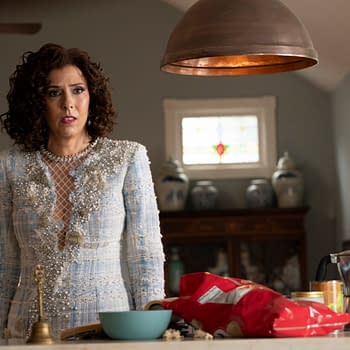Posted in: BBC, Disney+, TV | Tagged: bbc iplayer, doctor who
Doctor Who: Here's Why BBC License Fee Increases Through 2027 Matter
The BBC license fee will increase through 2027; some UK viewers may not be thrilled, but it is the best way to keep getting more Doctor Who.
Bad news for British Doctor Who fans and all TV viewers in the UK: the BBC license fee will rise with inflation again until 2027, as new Culture Secretary Lisa Nandy continues with her reset of relations and looks to the future. The corporation's funding was supposed to be returning to an inflationary rise last year but was handed a below-inflation rise by the Conservatives, which left it with £100M ($126M) less to spend. Before this, it was frozen for two years, putting vast amounts of pressure on BBC budgets. This is bad news for ordinary people who already have difficulty making ends meet but, well, good news for the BBC. The cost of an annual colour TV license from April 2025 will now be £174.50, an increase of £5, or an extra 42p a month. This is significantly less than the £10.50 increase in 2024-25, which was below inflation. The license fee pays for literally every aspect of the BBC, not only its TV programmes but its operational costs, including all the radio stations and its streaming app, BBC iPlayer, which has higher streaming numbers in the UK than Netflix.

Doctor Who and Every BBC Show Has Needed International Co-Production Funds
But first, the official statements: Nandy announced that the fee will return to rising in line with the CPI measure of inflation until the end of the charter period in 2027. She will also review BBC funding in the long term "to consider funding options to support the national broadcaster's long-term future, safeguarding the world-class content that millions of people know and love." The corporation's funding was supposed to be returning to an inflationary rise last year but was handed a below-inflation rise by the Conservatives, which left it with £100M ($126M) less to spend. Prior to this, it was frozen for two years, putting vast amounts of pressure on BBC budgets. This is why virtually every BBC program, especially dramas has needed an international co-producer or co-financing partner. You can thank the Tories for Doctor Who needing an international streaming co-finaning partner like Disney+.
Nandy announced that the fee will return to rising in line with the CPI measure of inflation until the end of the charter period in 2027. She will also review BBC funding in the long term "to consider funding options to support the national broadcaster's long-term future, safeguarding the world-class content that millions of people know and love."
Nandy's future funding review will come amid intense competition from streaming giants, YouTube and social media. The BBC's 100-year-old license fee funding model has long been considered anachronistic by some, and many have pushed for a change after 2027. An initial review was kickstarted by the previous government but never completed.
Nandy said, "The BBC provides much-needed programming for households across the country, including children's education, world-class entertainment, and trusted news for all people in all parts of the UK. I want to see it thrive for decades to come. Through the Charter Review, we will have an honest national conversation about the broadcaster's long-term future, ensuring the BBC has a sustainable public funding model that supports its vital work but is also fair and responsive to those who pay for it. In the short term, we are providing the BBC with funding certainty while supporting thousands more households facing financial hardship to spread the cost of a TV license."
A BBC spokesperson said, "We welcome confirmation that the license fee will increase in line with inflation next year. We want everyone to get value from the license fee, and we are committed to delivering trusted news, the best homegrown storytelling, and those special moments that bring us together. We also look forward to the debate about the future and working with the Government to ensure sustainable, long-term public funding. As part of these discussions, we will run our biggest ever public engagement exercise in 2025 so that audiences are at the heart of shaping our future."
The Good News and Bad News
First, the bad news: starting from 2027, the BBC license fee will get more expensive every year to keep up with inflation. At least that's not till 2027. The good news, which you may not agree with, is that the BBC will at least get more funds to operate and produce their TV programmes, including Doctor Who. The BBC has been underfunded for years, which has led to major layoffs, including in the news division, which has a bigger impact than you might think. For non-UK readers, the BBC is publicly funded and not by commercials, which means they're not beholden to stockholders or advertisers since they don't run advertisements or corporate sponsorship. You can thank the public charter for shows like Doctor Who and Call the Midwife not having or needing product placement. That is a major difference between the BBC and any commercial TV network.
The other major difference that Americans have difficulty getting their heads around is that the BBC license fee is compulsory for every household in the UK that watches broadcast television. Where PBS takes voluntary donations from viewers, every TV viewer has to pay the BBC license fee or get fined. British viewers get four BBC TV channels and twenty radio stations (the latter are free to stream online worldwide by non-UK listeners) and their domestic streaming app, the BBC iPlayer. The British public gets Doctor Who, Eastenders, Call the Midwife, Strictly Come Dancing, the investigative news program Panorama, and many more. After all, they literally paid for them. This is how deep the BBC is in the lives of the British.














